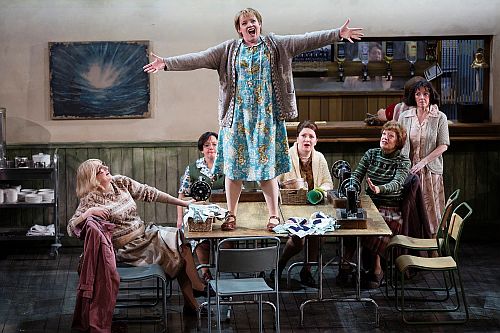Wagner, The Flying Dutchman: Soloists and Orchestra of Scottish Opera, Chorus of The Flying Dutchman / Francesco Corti (conductor), Edinburgh Festival Theatre, 16.4.2013 (SRT)
Cast:
Donald – Scott Wilde
Helmsman – Nicky Spence
Dutchman – Peteris Eglitis
Senta – Rachel Nicholls
Mary – Sarah Pring
George – Jeff Gwaltney
Production:
Harry Fehr (director)
Tom Scutt (designer)

As well as this being the Wagner bicentenary year, it also marks Scottish Opera’s 50th anniversary season. Wagner’s original plan had been to set The Flying Dutchman in Scotland (he only changed its location to Norway during the final rehearsals), so Harry Fehr need make no apologies for setting his anniversary production in Scottish Opera’s homeland. It works very well. He translates the action to a port town in the North East of Scotland at some time in the 1970s. There are references to the area’s background in oil in the Dutchman’s ship, which resembles a tanker, and to Scotland’s Presbyterian heritage by making George (or should that be Erik? Some names have been changed, allegedly to return to Wagner’s original intentions.), a gun-toting minister.
The first act is set in a grimy harbour with a grotty café to which Donald’s sailors retreat for a cuppa while the Helmsman keeps watch. The second act takes place in the village hall where the frustrated ladies impatiently await their husbands while assembling a finger buffet to celebrate their return. Some might criticise Fehr’s vision for diminishing the supernatural element of the story – it is almost entirely absent, and there is certainly no transfiguration in the closing moments – but its virtue is to make the story more human and to ground it in contemporary experience.
The cavorting of the townspeople at the start of the second act is doggedly close to drunken ceilidh dancing, and having Senta and the Dutchman make their cosmic declarations of love over a plate of sandwiches helps make these (normally impossibly distant) characters more sympathetic. The only thing that I found immensely irritating was the decision to keep Daland and Mary on stage, prissying around in the background during Wie aus der Ferne. The whole point of this duet is to show us two people alone against the blankness of eternity, and the unnecessary gestures going on in the background were misjudged and unwelcome.
Musically the evening was one of the strongest Scottish Opera have put together in a long time. I was especially impressed by Rachel Nicholls’ Senta, who sang the part with just the right combination of strength and flexibility. Hers is not a naturally large voice, but she used the instrument to stupendous effect, fully inside the tessitura and comfortable with the entire dramatic range. Peteris Eglitis sang the Dutchman with a tone of restrained grandeur, a noble contrast to the gruff but affable Daland of Scott Wilde. Nicky Spence’s bright tenor pinged his way attractively through the Helmsman’s music, and Jeff Gwaltney made a vigorous, even virile George – you could see why Senta spent all that time with him walking along the cliff tops. The specially assembled chorus also sounded fantastic, especially in the outer acts, though it was a shame that they felt they had to resort to acoustically altering the sound of the Dutchman’s crew; a necessary stewarding of scarce resources, perhaps, but it sounded contrived rather than creepy. The orchestra were on superb form, particularly the brass who underpinned the driving storm with convincing strength and, unlike the last time I heard him, Francesco Corti got the balance of sound just right, refusing to let the breakers unleashed from the orchestra pit overwhelm the singers on the stage.
This is the first time Scottish Opera have touched Wagner since their outstanding Ring of summer 2003. I must admit that, since they did away with their full time orchestra and chorus, I feared they would never do Wagner again, but to return to him so effectively in their anniversary year perhaps gives reason to hope.
Simon Thompson